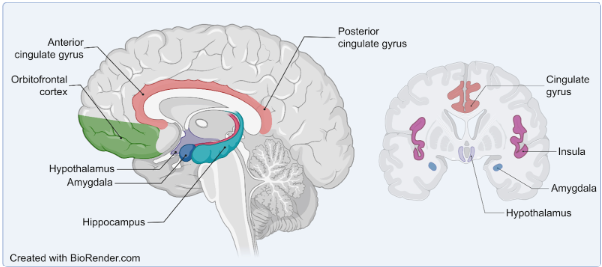Oleh: Thalia Kaylyn Averil
Borderline personality disorder (BPD) is a mental disorder that affects an individual’s ability to control their emotions. Someone with reduced emotional control can make them more impulsive, influencing their self-perception and damaging their relationships with others. In general, BPD sufferers have disturbances in their mood and social interactions, causing their thoughts, perceptions, feelings, and interpersonal relationships to be very different from those of the general population.
Studies show that BPD can be influenced by genetic, social, and environmental factors. Someone who has a close family member (for example: parents, siblings, or other relatives) with BPD is more susceptible to developing the disorder. Apart from that, social and environmental factors also play a role, as many individuals with BPD experience traumatic events during childhood, such as being abused or abandoned. Individuals with a history of having poor relationships with other people are also a risk factor for BPD. Recent studies have proven that some BPD patients have abnormalities in neurotransmitters or “messengers” in the brain, particularly serotonin. Apart from that, several parts of the brain were found to be smaller or abnormal in BPD sufferers, namely:
- The amygdala plays a role in controlling emotions, such as fear, anger, or anxiety
- The orbitofrontal cortex plays a role in planning and decision making
- The hippocampus plays a role in regulating behavior and self-control

Figure 1. Parts of the brain.
Borderline personality disorder (BPD) can cause a variety of symptoms that are generally grouped into four:
- Emotional instability
Individuals with BPD often feel intense negative emotions, such as anger, sadness, shame, fear, loneliness, and emptiness. Additionally, other symptoms they may experience are severe unpredicted mood changes in a short time. For example, the feeling of joy that arises after experiencing thoughts of suicide and despair several hours ago. People who experience borderline personality disorder also tend to perceive things in extreme terms, either as entirely good or entirely bad.
- Distorted thinking or perception
BPD can lead sufferers to have negative beliefs about themselves and other people, such as thinking that they are a bad person or feeling that other people are plotting against them. Moreover, individuals with BPD also often hear strange voices which sometimes feel like commands to harm themselves or others.
- Impulsive behavior
Individuals with BPD tend to have the urge to harm themselves, which can even lead to attempts to commit suicide. This also causes BPD sufferers to have the desire to take part in risky and reckless activities, such as consuming excessive alcohol or doing unprotected sex.
- Intense and unstable relationships with other people
If someone suffers from BPD, they may feel that other people are abandoning them when they are experiencing difficulties, resulting in emotions such as anger and anxiety. This is the reason some people send frequent messages, make sudden calls, or even threaten others. On the other hand, individuals with BPD can also feel angry and anxious if they perceive others as too dominating or frequently disturbing them. Therefore, patients with BPD are often trapped in a “love and hate relationships” with other people.
If you feel that you are experiencing signs and symptoms of BPD, you may consider consulting with a healthcare professional. However, you can also manage the emotions you’re experiencing by:
- Recognize things that can trigger impulsive behavior or anger
- Try to involve the people closest to you during treatment to help them better understand your condition
- Practice coping mechanisms to control emotions, such as meditation and breathing exercises. A study suggests that doing brief mindfulness meditation (BMM) using the Anapanasati meditation technique for 15 minutes daily can improve emotional processing. One of the keys to doing the Anapanasati meditation technique is directing full attention to your breath, paying attention to the sensation of each inhale and exhale.

Figure 2. An example of a meditation technique.
- Learn how to express emotions appropriately to avoid making yourself and others uncomfortable
- Avoid assumptions about what others are thinking or feeling
- Maintain a healthy lifestyle by eating a balanced diet, engaging in regular exercise, and participating in social activities
Resources
- National Institute of Mental Health. Borderline personality disorder [Internet]. Bethesda: National Institute of Mental Health; date of publication unknown [cited 2023 Nov 12]. Available from: https://www.nimh.nih.gov/health/topics/borderline-personality-disorder
- National Health Service. Overview – borderline personality disorder [Internet]. England: National Health Service; date of publication unknown [reviewed 2022 Nov 4] [cited 2023 Nov 12]. Available from: https://www.nhs.uk/mental-health/conditions/borderline-personality-disorder/overview/
- Mayo Clinic. Borderline personality disorder – diagnosis [Internet]. Rochester: Mayo Clinic; date of publication unknown [cited 2023 Nov 12]. Available from: https://www.mayoclinic.org/diseases-conditions/borderline-personality-disorder/diagnosis-treatment/drc-20370242
- Wu R, Liu LL, Zhu H, Su WJ, Cao ZY, Zhong SY, Liu XH, Jiang CL. Brief mindfulness meditation improves emotion processing. Front Neurosci [Internet]. 2019 Oct 10 [cited 2023 Nov 12];13:1074. Available from: https://www.ncbi.nlm.nih.gov/pmc/articles/PMC6795685/
- Antoniou G, Lambourg E, Steele JD, Colvin LA. The effect of adverse childhood experiences on chronic pain and major depression in adulthood: a systematic review and meta-analysis. British J of Anesthesia [Internet]. 2023 Apr 20 [cited 2023 Nov 12];130(6):729-46. Available from: https://www.bjanaesthesia.org.uk/article/S0007-0912%2823%2900131-9/fulltext
- TARA 4 Borderline Personality Disorder. Celebrities with BPD [Internet]. New York: TARA 4 Borderline Personality Disorder; date of publication unknown [cited 2023 Nov 12]. Available from: https://www.tara4bpd.org/new-page-42
